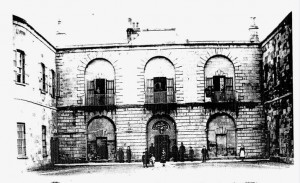LEARN MORE›››
Irish Crime Records
A large collection of 19th and early 20th century court and prison records have been published online. Irish crime records can sometimes contain valuable information about the individual and may also help to explain a change in their circumstances or reasons why they may be missing from certain records.
For the purposes of the guide we are looking at Irish crime records such as court records, prison registers and transportation records for convicts sent to Australia.
The Petty Session Court was the most local and lowliest court in the country and dealt with small or petty crime and civil disputes. Cases were usually judged by a Justice of the Peace (JP) or the Resident Magistrate (RM). The court order books are a comprehensive record of cases brought before the court.
The Petty Session Court Order Books have been published online at Findmypast. The online collection today includes books from 23 of the 32 counties of Ireland but not all districts are represented for each county. There is a list on the site that details the extent of the records for each county. The earliest records date from 1828, but most of the books only survive from the mid to late 19th or even early 20th century. A reference to a dispute or crime in a Petty Session Court Order Book could lead to a more detailed local newspaper report, published following the hearing.
These court books are a great resource for researching the local population, who either appeared as defendants, complainants or witnesses. The local Royal Irish Constabulary (RIC) will also appear as complainants, so if your ancestor was in the RIC, you might find details of him in the court records.
 A collection of surviving prison registers, housed at the National Archives of Ireland are also available on findmypast. As with the Petty Session Court Books, these registers are not complete for the entire island of Ireland nor do they survive for the entire 19th century. Dublin is very well represented in the prison registers and it is always worth checking these records if you have ancestors from Dublin.
A collection of surviving prison registers, housed at the National Archives of Ireland are also available on findmypast. As with the Petty Session Court Books, these registers are not complete for the entire island of Ireland nor do they survive for the entire 19th century. Dublin is very well represented in the prison registers and it is always worth checking these records if you have ancestors from Dublin.
In conjunction with the Australian government, a database was compiled of transportation records for individuals sent to Australia in the late 18th and early 19th century. Drawn from various sources, the database is the most comprehensive record of those tried and transported from Ireland. You can search the database for free on the National Archives website. The database should indicate the date and place of the trial, brief details of the crime and a reference to the source material. It is worth reading the accompanying guide to the source material, as there may be additional files in the National Archives of Ireland that will contain more details about your ancestor, such as the Convict Reference File (CRF). Convict Reference Files can contain a police report on the crime, letters from family members pleading for clemency or requesting to be sent out with the convict. If you have discovered a CRF for your ancestor, you can order a copy using our Manuscript Order Form.

